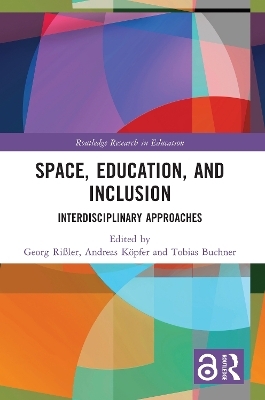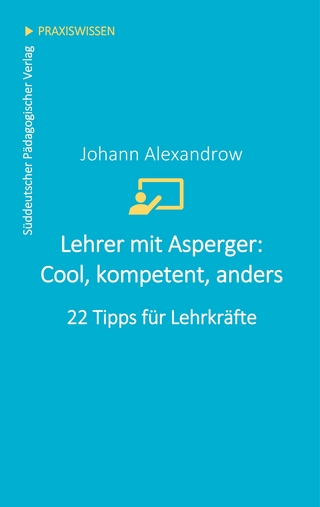
Space, Education, and Inclusion
Routledge (Verlag)
978-1-032-32133-2 (ISBN)
With research from an international range of scholars, the book explores the intersections, boundaries, and intermediary spaces of inclusion and exclusion within educational contexts. It advances thinking in inclusive education research and links discourses of the spatial turn in inclusive education with a call for thinking spatially. Instead of defining one spatial approach as the overarching framework for analysis, it considers the potential of combining spatial approaches from diverse disciplines, including social sciences, educational science, and geography. The book systematically identifies and links the relations between a diversity of spatial theoretical perspectives and phenomena of inclusion/exclusion.
This volume provides invaluable, transdisciplinary readings and reflections on space and spatiality in inclusive education, and will be highly relevant for academics, researchers and postgraduate students in the fields of inclusive education, educational theory and the sociology of education.
The Open Access version of this book, available at http://www.taylorfrancis.com, has been made available under a Creative Commons Attribution-Non Commercial-No Derivatives (CC-BY-NC-ND) 4.0 license.
Georg Rißler is affiliated with the Centre for Childhood in Education and Society at the University of Teacher Education in Zurich. His research focuses on practice theory, space and spatiality, inequality, common worlds and ethnography. Andreas Köpfer is Professor for Research in Inclusive Education at the University of Education Freiburg, Germany. His research focuses on international comparative perspectives in inclusive education, and social and spatial theories regarding dis-abilities and disadvantages. Tobias Buchner is a Professor at the Department of Inclusive Education at the University Teacher College, Upper Austria. His research focuses on Inclusive Education, Education and Space, Dis/ability Studies in Education, and Ableism in the Educational System.
1. Space, Education, and Inclusion: An Introduction to the Volume 2. Exploring Dimensions of Access Within Restrictive Spaces of Schooling 3. From Excluding Schools to Excluding Spaces: Spatial and Postcolonial Reflections on Inclusive Education in Africa 4. Evaluating Education Policies Through a Spatial Lens: Uncovering the Ability-Space-Regimes of Austrian New Middle Schools 5. Inclusive Research, In-/Exclusion and Ethics: After the Spatial Turn(s) 6. Inclusion, Exclusion, and the Spaces of Practices 7. The Education MarketSpace 8. Revisiting Kracauer’s Perspectives on Space and Inclusion/Exclusion 9. Digital Learning: Navigating Inclusive/Exclusive Spaces Through Open Educational Practice 10. Inclusion and Exclusion in Classroom Practices: Empirical Analyses of Conjunctive Spaces of Experience in Secondary Schools 11. Learning Spaces at the Intersections of Families and Preschools. 12. Teaching When Students Are Absent: A Study on the Relationship Between Space and Inclusion Based on the Covid Crisis. Afterword
| Erscheinungsdatum | 05.12.2023 |
|---|---|
| Reihe/Serie | Routledge Research in Education |
| Zusatzinfo | 12 Halftones, black and white; 12 Illustrations, black and white |
| Verlagsort | London |
| Sprache | englisch |
| Maße | 156 x 234 mm |
| Gewicht | 440 g |
| Themenwelt | Sozialwissenschaften ► Pädagogik ► Bildungstheorie |
| Sozialwissenschaften ► Pädagogik ► Sonder-, Heil- und Förderpädagogik | |
| ISBN-10 | 1-032-32133-4 / 1032321334 |
| ISBN-13 | 978-1-032-32133-2 / 9781032321332 |
| Zustand | Neuware |
| Haben Sie eine Frage zum Produkt? |
aus dem Bereich


